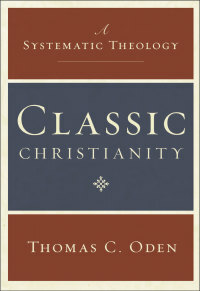Take a photo of a barcode or cover
I could read Thomas Oden all day. I love that he is at once thoroughly Wesleyan and orthodox. His approach to theology is refreshing and humble. I would love to read more by him.
challenging
informative
slow-paced
Oden provides a summary of the consensus views of Christain theology from the church fathers to the reformers. I most certainly will be keeping this book at my side for the next few years as a reference when preparing for preaching.
Oden sets out to provide a consensus view on the Christian faith, which is an incredibly challenging goal. Many would scoff and say there is no consensus view. I imagine liberal Christians reading this would not find an accurate representation of their understanding. I read this book in chunks, so I read the beginning last January, but I recall Oden's consensus view relies heavily on the early church. So it is not a consensus view that all who call themselves Christians would agree on in 2016, he argues it is the consensus of what all orthodox Christians believed in, say, 500 AD.
I would say Oden succeeds at his task. This book is thorough and detailed. He covers all the necessary ground. I wish I had read this one back in seminary rather than Grenz's Theology for the Community of God. I liked Grenz's work, but I think Oden does more for training Christian pastors. That is because the way he connects everything he says not just to scripture but to the early church. This book helps you realize, again and again, that the church does not just reinvent its teaching every generation but is a tradition following from scripture through history.
That said, Oden is a bit idealistic. There were moments when I expected him to lay out different Christian views and who held which and why they disagreed (election, Lord's supper, etc.) and he often did not. This wouldn't be a problem except many Christians would say that what Oden puts forth as the consensus view of free will and predestination is not consensus and this quotes from Augustine (and Calvin) are weighted to support his view but not theirs. Further, I know I am a poodle barking at a mastiff, but I think there was more diversity in the early church then Oden lets on. One might be Gregory of Nyssa and Origen's universalism. Sure they were the minority, but their view was their. Gregory played a huge role in the teaching of the Trinity, so its not like they were fringe either.
It seems most of the disagreement comes up in the third part, on the Holy Spirit. The first book, on God the Father, and the second, on Jesus, were places where the early centuries did have consensus (yes Nestorians and Monophysites, we see you waving). The Spirit section dealt with issues that it seems Christians have always disagreed on. Maybe Oden noted that and I just forget, after all it has been a long year.
That said, this is still a fantastic book. Anyone who wants a grasp of general Christian theology with a huge helping of early church fathers as well as a small helping of medieval and Reformers, should check this one out.
I would say Oden succeeds at his task. This book is thorough and detailed. He covers all the necessary ground. I wish I had read this one back in seminary rather than Grenz's Theology for the Community of God. I liked Grenz's work, but I think Oden does more for training Christian pastors. That is because the way he connects everything he says not just to scripture but to the early church. This book helps you realize, again and again, that the church does not just reinvent its teaching every generation but is a tradition following from scripture through history.
That said, Oden is a bit idealistic. There were moments when I expected him to lay out different Christian views and who held which and why they disagreed (election, Lord's supper, etc.) and he often did not. This wouldn't be a problem except many Christians would say that what Oden puts forth as the consensus view of free will and predestination is not consensus and this quotes from Augustine (and Calvin) are weighted to support his view but not theirs. Further, I know I am a poodle barking at a mastiff, but I think there was more diversity in the early church then Oden lets on. One might be Gregory of Nyssa and Origen's universalism. Sure they were the minority, but their view was their. Gregory played a huge role in the teaching of the Trinity, so its not like they were fringe either.
It seems most of the disagreement comes up in the third part, on the Holy Spirit. The first book, on God the Father, and the second, on Jesus, were places where the early centuries did have consensus (yes Nestorians and Monophysites, we see you waving). The Spirit section dealt with issues that it seems Christians have always disagreed on. Maybe Oden noted that and I just forget, after all it has been a long year.
That said, this is still a fantastic book. Anyone who wants a grasp of general Christian theology with a huge helping of early church fathers as well as a small helping of medieval and Reformers, should check this one out.
informative
slow-paced
This is a dense book with a lot of information on systematic theology. I enjoyed much of the content as well as found some parts too nuanced for me.



